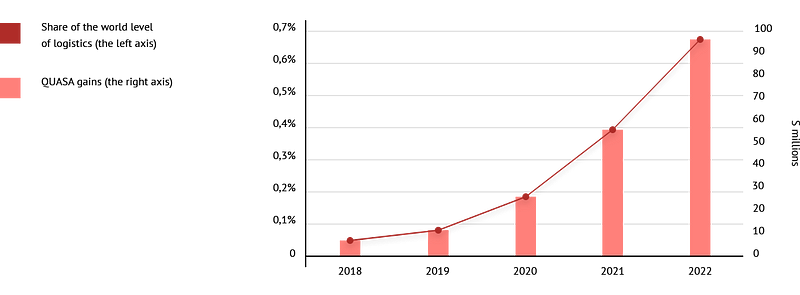
What is QUASA?
QUASA is a decentralized system that includes blockchain and consists of several smart contracts around the block and crypto currency. Such an approach takes the evolution of logistics technology to a whole new level, ensuring total security and privacy throughout the supply chain.
The QUASA platform is a system product developed by a consortium of the most powerful, competent and experienced logistics and logistics organizations in Russia, the CIS and other countries around the world.These companies work with leading Russian logistics, business and association organizations worldwide based on supplier agreements, partner agreements and memoranda.
project idea
The main concept of the project is to achieve technological breakthroughs in logistics by creating a transparent interaction system between all stakeholders. QUANT's distributed logistics platform provides innovative solutions based on the introduction of blockchain technology for supply chain management. This platform will help all participants to reap substantial benefits from a unique and transparent decentralized service and economic system based on QuasaCoin's own crypto currency.
Market
For the launch of this project, we have selected the Russian logistics market based on the following features:
QUASA is a decentralized system that includes blockchain and consists of several smart contracts around the block and crypto currency. Such an approach takes the evolution of logistics technology to a whole new level, ensuring total security and privacy throughout the supply chain.
The QUASA platform is a system product developed by a consortium of the most powerful, competent and experienced logistics and logistics organizations in Russia, the CIS and other countries around the world.These companies work with leading Russian logistics, business and association organizations worldwide based on supplier agreements, partner agreements and memoranda.
project idea
The main concept of the project is to achieve technological breakthroughs in logistics by creating a transparent interaction system between all stakeholders. QUANT's distributed logistics platform provides innovative solutions based on the introduction of blockchain technology for supply chain management. This platform will help all participants to reap substantial benefits from a unique and transparent decentralized service and economic system based on QuasaCoin's own crypto currency.
Market
For the launch of this project, we have selected the Russian logistics market based on the following features:
- Market volume The logistics sector in Russia accounts for 5.6% of GDP (compared to 2.7% in the US and 2% in China). The Russian market for freight forwarding services is estimated to generate $ 1 billion a year and reach 5% of the logistics market. The network of truck vehicles, a large number of ports and a leading role in international trade will help QUASA decentralize services to get off to a good start.
- No special license Unlike other countries, Russian legislation is not authorized for transport activities. This will enable the QUASA team to avoid additional costs and seek out customers for beta testing and localization as quickly as possible.
- Develop the IT infrastructure. By 2015, GLONASS equipment will be installed in 100% of Russian truck vehicles, and data collection systems will be introduced for site identification. This will help developers to introduce general online cargo tracking with the registration of ownership transfer in Blockchain.
- Close Partnership The corporate consortium supporting the QUASA platform consists of the most capable, competent and experienced logistics and logistics companies in Russia, the CIS and other countries around the world. These companies cooperate with leading logistics organizations, companies and associations in Russia and around the world, based on supplier agreements, partner agreements and memoranda
- Crypto-currency law status. As for the legal status of the cryptocurrency, we can talk about the decriminalization of such currencies in Russia, not about their full legalization.
ask
Currently, the cargo cruise market shares with the taxi market before it is conquered by Internet companies: it is not transparent, chaotic and split between regional companies, not because of competition but for internal reasons and unknown rules.
Logistics is not just about moving cargo. It also involves the movement of a great deal of information about the consignor and consignee, the nature of the payload, how it is handled and packaged, what to do with that item at the final destination, and so on. It goes without saying that logistics works with large documents that make this complicated industry even more opaque. The final recipient can not trace the path created by the cargo before it reaches the receiver.
The nature of the problem to be solved by the project
The replacement of central services by SMARTCONTRACT and BLOCKCHAIN technologies ensures transparency in the logistics market.Commission generation will become clearer and the price for the service will be reduced thanks to the open and transparent interaction between all parties involved in the supply chain. QUASA technology will significantly reduce the time, financial and labor resources involved in the delivery process. At the same time, new markets will be opened up to operators, while the QUASA platform will serve as a benchmark for the quality of services offered on the market.
Another problematic process is the ability to get information about the movement and condition of the cargo. Currently implies the use of additional resources, which consequently increases the commission size. When using the QUASA platform, this data is integrated into BLOCKCHAIN, while the smart contract ensures compliance with all contract terms and automatically performs joint billing according to the data contained in Blockchain. Thus, the control over the fulfillment of the agreement is given.
Industrial problems
More than 80% of all freight shipments are made by middlemen. Here are the suitable reasons:
About the trust.
According to the study, total economic crime losses in the US transportation and logistics sector were $ 8 to $ 30 billion. People are offered to contract with partners and clients from legal and economic perspectives to avoid losses of $ 40 billion a year, while 20% of the freight is not yet fully insured.Strategic issues pose a particular risk for opportunistic behavior, which is included in the price of freight transport.
According to the study, total economic crime losses in the US transportation and logistics sector were $ 8 to $ 30 billion. People are offered to contract with partners and clients from legal and economic perspectives to avoid losses of $ 40 billion a year, while 20% of the freight is not yet fully insured.Strategic issues pose a particular risk for opportunistic behavior, which is included in the price of freight transport.

Solution
Control of freight shipments is on demand until the deal is successfully completed. Blockchain lists all actions that preclude trust-free relationships between the parties. An Intelligent Contract to be agreed upon at the beginning of the delivery automatically carries out a complete billing according to the data contained in the blockchain.
The risk of bankruptcy of cargo owners.
This allows the operator to perform the due diligence analysis of a cargo owner and to charge a premium for the risk of potential bankruptcy in relation to his obligations. Logistics companies charge a premium of up to 30% and even refuse certain transactions depending on the partner's reputation.

Solution
Authorized registrations and cargo owners increase overall responsibility. Through the use of modern DLT technology, QUASA will provide private license suppliers. Other organizations must receive and verify this information.
The risk of hidden damage.
If the owner of the load (or the last person in the supply chain) receives the defective item, there is no possibility to claim damages in court because it is not known who is responsible for the damage.
Authorized registrations and cargo owners increase overall responsibility. Through the use of modern DLT technology, QUASA will provide private license suppliers. Other organizations must receive and verify this information.
The risk of hidden damage.
If the owner of the load (or the last person in the supply chain) receives the defective item, there is no possibility to claim damages in court because it is not known who is responsible for the damage.

Solution
QuasaCoin is a single virtual currency in which all QUASA billing is performed.
Tax avoidance risk.
If the tax inspectorate suspects at least one of the supply chain partners of tax evasion, the cargo will be withdrawn or suspended.
QuasaCoin is a single virtual currency in which all QUASA billing is performed.
Tax avoidance risk.
If the tax inspectorate suspects at least one of the supply chain partners of tax evasion, the cargo will be withdrawn or suspended.

Solution
The assumptions for automatic freight insurance are not only the risk of opportunistic partner behavior, but also the risk of force majeure.
Inventory risk
In this case, the logistics company is forced to change the contract in order not to take into account the risk of impairment. This makes logistics services more expensive.

Insurance is not enough
Most freight forwarders insure only transport losses, but no loss of freight or damages.
Most freight forwarders insure only transport losses, but no loss of freight or damages.

Solution
Online GPS tracking of freight locations and conditions is done using Blockchain technology. In the early stages, QUASA is integrated into existing tracking technology providers through its protocol (https, mqtt, etc.). Data is collected and shown to the end users.
Problems with information barriers and high prices.
The cost of finding operator fee and transaction fee information is very high due to market segmentation and the lack of standard payment algorithms as well as paper flows, additional services and taxes. This makes the market less competitive and can be controlled by the seller. The cargo owners are therefore faced with the need to know and compare previous transport prices and to perform certain expensive analyzes. This problem affects the owner and operator of the cargo. For example, the lack of a common information space leads to a lack of efficiency and delays due to lack of data on free containers.
Online GPS tracking of freight locations and conditions is done using Blockchain technology. In the early stages, QUASA is integrated into existing tracking technology providers through its protocol (https, mqtt, etc.). Data is collected and shown to the end users.
Problems with information barriers and high prices.
The cost of finding operator fee and transaction fee information is very high due to market segmentation and the lack of standard payment algorithms as well as paper flows, additional services and taxes. This makes the market less competitive and can be controlled by the seller. The cargo owners are therefore faced with the need to know and compare previous transport prices and to perform certain expensive analyzes. This problem affects the owner and operator of the cargo. For example, the lack of a common information space leads to a lack of efficiency and delays due to lack of data on free containers.

Solution
A single information system performs efficient data analysis and stops signal equipment downtime. This reduces the delay while increasing the overall efficiency. Forecasts help reduce truckloads and improve planning horizons while avoiding traffic jams.Customers can choose a shipping mode that meets the requirements for additional pricing, terms and services. A relatively low service commission (2-3% vs. 8-15% for traditional carriers and 10-25% for brokers) distinguishes QUASA from other field competitors.
Idle problems.
The pendulum principle contributes up to 50% to the efficiency losses in logistics. The problem is that export and import balances are not being maintained in the subregion. For example, a truck driver drove drinks from Arezzo to Thessaloniki, but returned with an empty vehicle because nothing could be exported from Salonika. As a result, tenants usually lower their rates.
A single information system performs efficient data analysis and stops signal equipment downtime. This reduces the delay while increasing the overall efficiency. Forecasts help reduce truckloads and improve planning horizons while avoiding traffic jams.Customers can choose a shipping mode that meets the requirements for additional pricing, terms and services. A relatively low service commission (2-3% vs. 8-15% for traditional carriers and 10-25% for brokers) distinguishes QUASA from other field competitors.
Idle problems.
The pendulum principle contributes up to 50% to the efficiency losses in logistics. The problem is that export and import balances are not being maintained in the subregion. For example, a truck driver drove drinks from Arezzo to Thessaloniki, but returned with an empty vehicle because nothing could be exported from Salonika. As a result, tenants usually lower their rates.

QUASA, profit and goal

Further information:
Website: http://www.quasa.io/
Whitepaper: http://quasa.io/whitepaper
Facebook: https://www.facebook.com/quasagroup
Twitter: https://twitter.com/quasagroup
Telegram: https : //t.me/quasafreight
Instagram: https://www.instagram.com/quasagroup
Whitepaper: http://quasa.io/whitepaper
Facebook: https://www.facebook.com/quasagroup
Twitter: https://twitter.com/quasagroup
Telegram: https : //t.me/quasafreight
Instagram: https://www.instagram.com/quasagroup
By Martin Vunk
Tidak ada komentar:
Posting Komentar